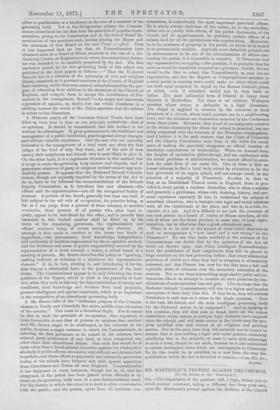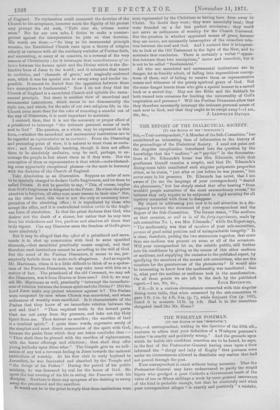MR. MARTINEAU'S PROTEST AGAINST THE CHURCH.
(To rims EDITOR or TUE "SPLICTATORI
Sin,—The importance of the question will, I hope, induce you to admit another comment, taking a different line from your own, upon Mr. Martineau's protest against, the doctrine of the Church
of England. No explanation could commend the doctrine of the Church to his acceptance, however much the dignity of his protest may prompt the old wish, "Tails cum els, utinam noster eases." But for our own sake, I desire to make a counter- protest against the interpretation he puts on that doctrine. His words are these :—" So long as its sacramental principle remains, the Established Church rests upon a theory of religion utterly at variance with all the residuary varieties of Puritan faith, and amounting, as many of us conceive, to a reversal of the very essence of Christianity ; for it intercepts that inamediateness of re- lation between the human spirit and the Divine which is the dis- tinctive boon of Jesus to the world ; and it reinstates that resort to mediation, and channels of grace,' and magically-endowed men, which it was his special aim to sweep away and render im- possible. It cannot be denied that the opposition between these two conceptions is fundamental." Now I do not deny that the Church of England is a sacerdotal Church and upholds the sacra- mental principle. But there is another view of sacerdotal and sacramental institutions, which seems to me demonstrably the right one, and which, for the sake of our own religious life in the Church even more than for the sake of removing a scandal out of the way of Dissenters, it is most important to maintain.
I contend, then, that it is not the necessary or proper effect of a priesthood to intercept " the intimate personal access of each soul to God." The question, as a whole, may be expressed in this form,—whether the sacerdotal and sacramental institutions are to be regarded as representative or as exclusive. From the Dissenting and protesting point of view, it is natural to treat them as exclu- sive ; and Roman Catholic teaching, though it does not affirm them to be absolutely exclusive, may be said, perhaps, to en- courage the people to feel about them as if they were. But the conception of them as representative is that which—notwithstand- ing some apparently exceptional phrases—is the most in harmony with the doctrine of the Church of England.
Take Absolution as an illustration. Suppose an order of men to be specially charged to declare God's forgiveness, and let them be called Priests. It will be possible to say, "This, of course, implies that God's forgiveness is delegated to the Priest. He whom the priest absolves is forgiven, all other men must remain in their sins." But, on the other hand, this view is not the only or necessary inter- pretation of the absolving office ; it is repudiated by those who accept the office, and it is contradicted totidem verbis in the Angli- can form of absolution. In that the priest declares that God, who desires not the death of a sinner, but rather that he may turn from his wickedness and live, pardons and absolves all them that truly repent. Can any Dissenter state the freedom of God's grace more absolutely ?
But it may be alleged that the effect of a priesthood and sacra- ments is to shut up communion with God to some specified channels,—that sacerdotal practically means magical, and that therefore such institutions cannot be according to the will of God. But the creed of the Puritan Dissenters, it seems to me, per- emptorily forbids them to make such allegations. And as regards Mr. Martineau, whom it is a little difficult to think of as a spokes- man of the Puritan Dissenters, we may take issue with him on a matter of fact. The priesthood of the old Covenant, we may ask the Dissenters, was it from Heaven or from men ? Did it, we may ask Mr. Martineau as well, practically " intercept the immediate- ness of relation between the human spirit and the Divine ?" Did the Lord Josue make any protest whatever against it? The Psalms were composed by men whose Church was sacerdotal, and whose ordinances of worship were sacrificial. Is it characteristic of the Psalms that they know of no immediate relation between the soul and God ? "Thou requirest truth in the inward parts. Cast me not away from thy presence, and take not thy Holy Spirit from me. Thou desired no sacrifice ; the sacrifice of God is a troubled spirit." I quote these words, expressive surely of the simplest and most direct communion of the spirit with God, because the psalm from which they are taken concludes thus :- " Then shalt thou be pleased with the sacrifice of righteousness, with the burnt offerings and oblations ; then shall they offer young bullocks upon thine altar." The Gospels give us no indi- cation of any but a reverent feeling in Jesus towards the national institutions of worship. At his first visit in early boyhood to Jerusalem, he was fascinated and absorbed by the Temple and "the things of his Father." During the period of his public ministry, he was devoured by zeal for the house of God. He spent the last evening of his life in eating the Passover with his disciples. Nowhere is there any symptom of his desiring to sweep away the priesthood and the sacrifices.
It would not be to the point to reply that those institutions were
soon represented by the Christians as having been done away in Christ. No doubt they were ; they were essentially local ; they were founded on a far less perfect revelation ; they could not serve as ordinances of worship for the Church Universal. But the question is whether appointed means of grace, because they are means, are necessarily interceptive of the immediate rela- tion between the soul and God. And I contend that it is impossi- ble to look at the Old Testament in the light of the New, and to maintain that conclusion. There is certainly a verbal " opposi- tion between these two conceptions," means and immediate, but it is not to be called " fundamental."
All who use sacerdotal and sacramental institutions are in danger, let us frankly admit, of falling into superstitious concep- tions of them, and of failing to receive them as representative means and witnesses of the purely spiritual grace of God. But the same danger besets those who give a special honour to a sacred, book or a sacred day. May not the Bible and the Sabbath be both turned into occasions for limiting the universality of God's inspiration and presence? Will the Puritan Dissenters allow that they therefore necessarily intercept the intimate personal access of each soul to God, and that they ought to be swept away ?—I am,.



































 Previous page
Previous page